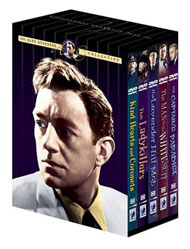| Release List | Reviews | Price Search | Shop | Newsletter | Forum | DVD Giveaways | Blu-Ray/ HD DVD | Advertise |
| Reviews & Columns |
|
Reviews DVD TV on DVD Blu-ray International DVDs Theatrical Reviews by Studio Video Games Features Collector Series DVDs Easter Egg Database Interviews DVD Talk TV DVD Talk Radio Feature Articles Columns Anime Talk DVD Savant HD Talk Horror DVDs Silent DVD
|
DVD Talk Forum |
|
|
| Resources |
|
DVD Price Search Customer Service #'s RCE Info Links |
|
Columns
|
 |
The Alec Guinness Collection |
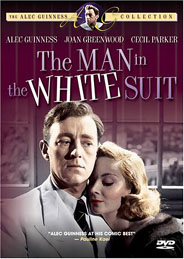
|
The Man in the White Suit Anchor Bay 1951 / b&w / 1:37 flat / 85 min. / Street Date September 10, 2002 / $69.98 Starring Alec Guinness, Joan Greenwood, Cecil Parker, Michael Gough, Ernest Thesiger, Howard Marion-Crawford, Henry Mollison, Vida Hope Cinematography Douglas Slocombe Art Direction Jim Morahan Edited by Bernard Gribble Original Music Benjamin Frankel Written by John Dighton, Alexander Mackendrick and Roger MacDougall Produced by Michael Balcon, Sidney Cole Directed by Alexander Mackendrick |
The Man in the White Suit is a practically perfect movie. It's a droll comedy equally as funny as the rest of the Ealing films, yet it effortlessly carries some profound themes about progress versus commerce and labor - subjects rarely covered in films, and almost never covered well. Science fiction fans claim the movie, because it's about nothing less than a world-altering, potentially menacing invention. Its portrait of the progressive scientist as an inspired force, whose ambitions might not be for the general good, was certainly a strong theme around this time: critics immediately seized upon the film as really being about the threat of atomic power.
Stratton's indestructable cloth is a concept that probably would upset the economic balance of the world. Textiles is a labor-intensive industry, and perishable clothing needs to be repaired, cleaned and replaced. The labor spokesmen whine about hanging onto their hard-won concessions, but they're right when they see that Stanley's cloth will put them all out of business. The Man in the White Suit is the rare picture that acknowledges that man relates to the basics of his life (food, work, etc) not directly, but through social and economic conventions that may be obsolete, but are needed just the same. It's all extremely sophisticated, especially when compared to the usual emotional movie treatment of the labor-maagement-technology triangle, starting way back with Metropolis.
Sidney Stratton is Ibsen's Enemy of the People, and a White Knight of truth at the same time. The film is a great lesson-teacher for kids, or anyone used to the 6:00 News idea that all social problems are soluble in yes-no, right-wrong terms. Sidney's avowed crusade is to save the world, but he's really a fallable human like the rest of us, with an ego that seeks recognition, wealth and love. He's a little like the character K from The Trial, who sees himself as society's victim, yet has an ego that elevates his personal crusade over the general welfare of society at large.
You wouldn't know by watching it that The Man in the White Suit is this deep - the film is a constant flow of verbal and slapstick humor. The farcical misunderstandings lead to chases that resemble Chaplin and Keaton films (the attempt to enter the Birnley manse), and Sidney's takeover of the Birnley labs is a wonderful pre-Brazil view of social power interpreted as office space. Hoskins, the lab manager (Henry Mollinson) is shoved into a jammed closet, where he has to climb over his desk, and wear a blitz helmet against Sidney's explosive experiments.
I'm told that the funny semi-musical noises made by Sidney's synthetic fiber apparatus were made into a novelty song that was popular on the (British?) radio.
Just by staying starry-eyed and dreamy, Guinness makes Sidney a loveable and determined Quixote character. Joan Greenwood's voice is a very sexy, velvety croak; as Sidney's Dulcinea she becomes rightfully inspired by his impossible dream. Stuffy Cecil Parker and crassly thick Michael Gough are terrific foils as the imbecilic captains of industry, and a mortiferous Ernest Thesiger, fifteen years after The Bride of Frankenstein, is grandly anemic as the Machavellian textile kingpin. The movie has great fun making the bosses' line of limos appear like a funeral cortege.
There's a bit of the same setup as A Place in the Sun working here too. Sidney first captures the eye of Bertha, the union-obsessed working girl (Vida Hope), but can't see her adoration for the charms of textile princess Daphne. It adds a bit of tension that's not all that flattering to the Sidney Stratton character. When he wanders off, contemplating the 'fix' for his failed invention, and blinded by its possible social effects, he could easily be some scientist enraptured by an idea for a new kind of super-weapon.
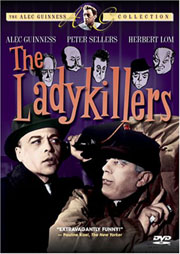
|
The Ladykillers Anchor Bay 1955 / b&w / 1:37 flat / 97 min. / Street Date September 10, 2002 / $69.98 Starring Alec Guinness, Cecil Parker, Herbert Lom, Peter Sellers, Danny Green, Jack Warner, Katie Johnson, Philip Stainton, Frankie Howerd Cinematography Otto Heller Art direction Jim Morahan Editor Jack Harris Original Music Tristram Cary Written by William Rose Produced by Michael Balcon Directed by Alexander Mackendrick |
In beautiful Technicolor, The Ladykillers gets bonus points for having a young (and rather fat) Peter Sellers high in the cast. Kind of a gloss on the O'Henry story The Ransom of Red Chief, this amusingly silly story sets four supposedly hardened criminals against an enemy for whom they're totally unprepared - a little old lady who totters around, talks in a high voice, and has to be humored by everyone.
Guinness here is said to be doing an Alastair Sim imitation, with a set of false teeth that are hilarious on their own. As he becomes desperate and bedraggled, he looks more like a ghoulish television horror host, with a sallow face and glaring eyes. At times, the deadpan menace about Guinness and his cronies resembles a Charles Addams cartoon. The Ladykillers is a comedy with a concept that somehow makes us smile even when nobody's trying to be funny. It just is.
It's often been assumed that little Mrs. Wilberforce was the inspiration for the little old lady in the tweety-pie cartoons. She walks and talks similarly, uses her umbrella as a weapon, keeps birds as pets, and tends to be oblivious to things happening around her. This might not be true, because the Tweety Pie cartoons started around 1949, and I'm not sure when exactly the little old lady character entered the cartoon series. The graphic setup, with the house at the end of a street overlooking a railroad switchyard (?) is something out of a cartoon, especially the way little Mrs. Wilberforce totters on her way down the street, with the big buildings looming about her.
The humor in William Rose's screenplay comes from the way the crooks constantly underestimate Mrs. Wilberforce, and especially how they misread her relationship with the police. They spend the second half of the film dealing with the necessity of disposing of her because she knows too much. In reality, she's such a petty nuisance, the cops wouldn't believe anything she says. The cleverness of the script is in its idea that Mrs. Wilberforce's feeble virtue is stronger than all the crooks put together - they defeat themselves with their own suspicion, cynicism and cowardice.
Peter Sellers' part isn't that fleshed out. Herbert Lom is excellent as the most sinister of the bunch, and Cecil Parker and Danny Green make nice softies who fall under the old lady's kindly spell. Jack Warner (The Quatermass Xperiment) and his bobbies are wonderful (fantasy?) cops who treat Mrs. Wilberforce with limitless patience and gentleness. Frankie Howerd of the Carry On comedies has a nice bit, too.
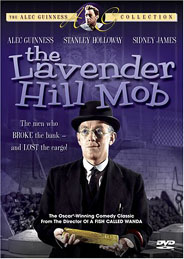
|
The Lavender Hill Mob Anchor Bay 1951 / b&w / 1:37 flat / 81 min. / Street Date September 10, 2002 / $69.98 Starring Alec Guinness, Stanley Holloway, Sid James, Alfie Bass, Audrey Hepburn Cinematography Douglas Slocombe Art Direction William Kellner Editor Seth Holt Original Music Georges Auric Written by T.E.B. Clarke Produced by Michael Balcon Directed by Charles Crichton |
The most famous comedy of the bunch, The Lavender Hill Mob is a fairly basic caper film that in its time (right at the beginning of the 'serious' side of the subgenre, The Asphalt Jungle) was the height of clever comedy. The Ealing comedies in particular liked to contrast their anarchic stories with the ultra-civilized English landscape; the basic gag has the hero (usually Guinness) getting away with some crime or another with a big grin on his face, amused by the fact that no matter what crazy thing he's doing, the society around him is too complacent to notice.
Here Guinness plays the Walter Mitty-like Henry Holland, a Bartleby who makes good on his dreams of crime and glory. He and accomplice Stanley Holloway are like two boys discovering how much fun it is to be bad, and there's another rich vein of humor to be mined from their joy in pretending to be hardened criminals ("call me Dutch!").
The gold bullion robbery is deceptively simple (not a lot of security for such a fortune in ingots) but the rest of their plan is top-notch - the actual smuggling idea must have been inspired by the writer's daydreams of how to defeat Britain's stiff monetary and tax controls. As in The Ladykillers, it's the 'human element' that lets them down. The caper genre can't be said to have developed much over the years, when its very first films so perfectly exploit its potential.
It's hard to grasp how tiny the Ealing productions unit was, when a film like The Lavender Hill Mob has such fluid camera work, and locations in Paris. I understand that in reality, the films were very inexpensive, and even when they were successful, the economics of the British film industry didn't bring the company great riches.
Guinness and Holloway are greatly aided by Sidney James (the Carry Ons, A Kid for Two Farthings, Trapeze, Quatermass 2) and Alfie Bass (The Fearless Vampire Killers, Alfie), comics who mostly play straight men for Guinness's star performance. The clever flashback structure must have been copied from Kind Hearts and Coronets. And for the completists, you can indeed see Audrey Hepburn in an early bit in the very first scene. She already looks as if she's been a star for years.
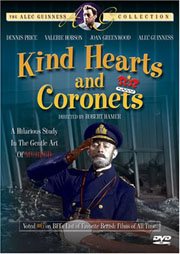
|
Kind Hearts and Coronets Anchor Bay 1949 / b&w / 1:37 flat / 106 min. / Street Date September 10, 2002 / $69.98 Starring Dennis Price, Valerie Hobson, Joan Greenwood, Alec Guinness, Audrey Fildes, Miles Malleson Cinematography Douglas Slocombe Art Direction William Kellner Editor Peter Tanner Original Music Ernest Irving Written by Robert Hamer, John Dighton from a novel by Roy Horniman Produced by Michael Balcon Directed by Robert Hamer |
This Alec Guinness collection is really five different kinds of comedies, and Kind Hearts and Coronets is considered the classiest of them all, one of the best black comedies yet done. Since cynical and morbid humor is now so ordinary, the impact of a solid black comedy like this, back in 1949, must have been considerable. Louis D'Ascoyne is a knave from his black heart (blackened with some justification) to his sharp tongue, and his caddish involvements with those who cross his path are satirical social criticism so venemous, you'd think the author had a personal grudge against English nobility.
The landed gentry, secure in their positions and wealth, with laws to say that they're better than their common neighbors, are an easy target. But Kind Hearts and Coronets goes further than the usual ribbing to suggest that in such a decadent society, a Borgia-like ruthlessness is too good for them. Death and murder are approached with a calm optimism, and without emotions - for Louis, revenge is a dish best served cold. Nothing is gratuitous; Louis dispatches his enemies with the steady hand of an insect exterminator. What he doesn't acknowledge is that he is himself one of the hated family he works so hard to rub out: we wonder what kind of Duke he'll be, when he promises to keep 'his people' as best he can, while receiving them so coldly.
Kind Hearts and Coronets manages to make all this mayhem screamingly funny, without resorting to cheap gags or really sick humor ... almost. Louis narrates the story, and peppers his killings with nasty little quips that show his aloof, snobbish detachment, even as he poisons a parson or blasts a victim with a shotgun. One killing is visually very similar to one in Chaplin's Monsieur Verdoux, with a couple having tea on the lawn interrupted by a blast in the background.
Reviewers always make a big deal about Alec Guinness'es stunt casting as all eight members of the D'Ascoyne family. He's commands the screen in the brief parts, but this picture really belongs to Dennis Price, who conjures up a chillingly credible picture of class snobbishness. He personifies the blue-blood ethic of privilege even as he condemns the attitude in his ill-fated relatives. Strangely enough, when things don't go his way at the end of the story, he also demonstrates incredibly graceful manners. He's no phony or usurper, but a determined revenger getting his rights.
At first Louis seems to be taking terrible advantage of his adulterous mistress Sibella, until she shows just as much talent for devious calculation as he. Louis' rule seems to be, 'fairness until crossed.' Sibella snubbed him for not being interested in marriage when he was poor, so he has no problem bedding her and cuckolding her husband Lionel. Since the noble game is to always choose self-interest, his caddish behavior is totally consistent. It's the widow Edith who he feels is the right choice for a Duchess; her maddening idea of what a 'responsible' upperclass person should be and do fits right in with his idea of virtue.
Dennis Price is just great, finding 5 ways to look down his nose at people while worming his way into the good graces of his victims. This is Joan Greenwood's best role that I have seen, and she makes great use of her wonderful voice. She has the film's one priceless dialog line, spoken in the perfect way at precisely the right moment: "Pigs might fly."
Valerie Hobson is also right up there, as sincere as a basically clueless noble can be as she proclaims that an inn owner should not serve liquor on moral grounds - protecting the commoners from their own vices, as it were. There's Miles Malleson again, serving the same function he does in the similarly structured The Captain's Paradise. Arthur Lowe, Laurence Naismith, and Savant favorite Richard Wattis each have very small bits.
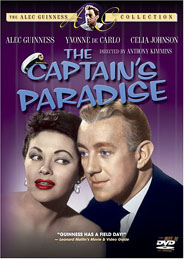
|
The Captain's Paradise Anchor Bay 1953 / b&w / 1:37 flat / 93 min. / Street Date September 10, 2002 / $69.98 Starring Alec Guinness, Yvonne De Carlo, Celia Johnson, Charles Goldner, Miles Malleson Cinematography Ted Scaife Art direction Paul Sheriff Edited By G. Turney-Smith Original Music Malcolm Arnold Written by Alec Coppel and Nicholas Phipps Produced and Directed by Anthony Kimmins |
The extra disc in the boxed set, The Captain's Paradise is said to technically not be an Ealing film, but it's certainly in the spirit, and made by some of the same talent. It's a farce about a bigamist with wives in two ports, a genteel heel living a double life. Apparently the film was changed afterwards to make Nita a girlfriend instead of a second wife, to avoid censor problems in the U.S. Sheesh - someone should have lightened up.
Captain St. James has quite a selfish racket going, one that suits his personal desires to a 'T', while restricting his two wives to very limited lives. One comedy throughline makes him the envy of his own first mate, (Charles Goldner), who yearns to follow in his footsteps. Even the Sheikh (Ferdy Mayne) seems to envy St. James, and he might have a harem.
This kind of farce rarely got beyond the 'running between bedrooms' comedy pitch, even though most of the Doris Day movies had clever themes of their own. Unlike most of the later films, Guinness is really getting away with it - there's no frustrated sex or nervous virginity here. When Billy Wilder tried to get down and basic with an equation of wife and whore in Kiss Me, Stupid, the critics had some ammunition (a fairly smutty context) with which to object. The mature The Captain's Paradise is at least the equal of the Wilder, and far more sophisticated than the Doris Days.
Instead of being dopes to be fooled, the women here are allowed their essential humanity. St. James has them pigeonholed into roles that cater to his desires. He wants prim and bright Celia Johnson to be the nanny-mommy housewife, and cynically encourages her to bear a child to keep her nailed into the life he's planned for her. Bombshell Yvonne De Carlo (a great dancer who cajoled Guinness into learning for the film) has nabbed her man with her looks, but doesn't want to spend the rest of her life dancing and dining. St. James' paradise is a selfish setup for him, based on his infantile wants and prejudices. Mommy Celia keeps him comfy and is probably kept at a platonic distance most of the time, but the hot Latina (is Spanish Moroccan Latin?) Yvonne is the forbidden playground where he gets to be a bad boy. For intellectual stimulation, he ignores both of them and instead talks to his male passengers, professors and diplomats.
Usually films like this end in a chase of musical beds and bellboys, where all is sorted out. Or Guinness would be revealed to be twins sharing one identity, and so appease the wives in the audience while letting the randy men have their fantasy. Like Into the Woods, The Captain's Paradise gets all that over with a little beyond the midpoint, and then plunges into unexplored thematic territory. St. James' smug plans are overturned in a surprisingly modern way. The mommy/playgirl oppposites in the two wives are fully demonstrated to be aspects of both women, that both need to express. The chagrin on Guinness' face is pure male shock over the revelation that male-female relations weren't created just for his personal benefit. St. James is let down easy, and proves that he's got a chivalric streak in him, through his gesture to save Nita at the end. As the picture fades, he no longer has a boat or a paradise to enjoy, but maybe he'll be a little more fair to the next lover he encounters.
Never breaking control, Guinness again gives us a fully-rounded cad of a character who's a lot of fun to watch. Celia Johnson (Brief Encounter, The Prime of Miss Jean Brodie) gets to prevail as the English wife who finds her wings (literally, as the other man is a pilot) and Yvonne De Carlo is better than okay as the 'dark, sensual' type who really wants to learn to cook. Charles Goldner does great work in a role that makes the film's premise function; favorites Ferdy Mayne, Sebastian Cabot, Miles Malleson and Peter Bull have standouts as well.
One caveat - there's a lot of Spanish language in the film and although the lines are well written and learned by the non-Spanish actors, their accents are mostly dreadful, God-awful, as only the English seem to do them. (Strange, for English actors always seem better than anyone when doing foreign accents in English.) American Yvonne De Carlo, unfortunately, comes off as an idiot to Spanish-speaking audiences, as her bad accent is very distracting.
Anchor Bay's The Alec Guinness Collection is blessed with five near-perfect transfers of movies we previously were used to seeing in a range of good to poor quality. The b&w films are clean and snappy, and the color in The Ladykillers is rich and atmospheric. I don't think anyone is transferring old pictures for standard DVD releases as consistently well as Anchor Bay. With just a couple of exceptions, I haven't seen a bad-looking older film from them in years. The soundtracks are equally strong. There are no subtitle tracks, but all the clipped English dialogue was easy to understand.
Each disc has an attractive cover, and comes with an original trailer, and a lengthy text essay on Guinness'es career by the very capable Avie Hern. Several have alternate French audio tracks.
The Alec Guinness Collection
Packaging: five keep cases in card box
Reviewed: October 22, 2002
Review Staff | About DVD Talk | Newsletter Subscribe | Join DVD Talk Forum
Copyright © MH Sub I, LLC dba Internet Brands. | Privacy Policy | Terms of Use
|
| Release List | Reviews | Price Search | Shop | SUBSCRIBE | Forum | DVD Giveaways | Blu-Ray/ HD DVD | Advertise |






